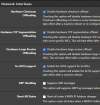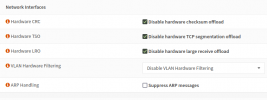I have had pfsense working fine on this same HW for years. Proxmox version has been (since released) the same as it is now, and pfSense had been (for months) the pfSense+ version 22.x (and before that pfSense CE). The one thing that changed is now Proxmox is installed on ZFS (native proxmox install) intead of RAID 1. pfSense got a fresh install (I did not move the old VM over to the new hypervisor install)
Since I started running on this new install with production traffic, pfSense would stop relaying traffic to/from the hypervisor every few minutes. I'd IPMI into the hypervisor and see nothing in the logs. But the hypervisor couldn't ping pfSense over the LAN, much less access the WAN.
I'd SSH into pfSense, nothing in the logs. pfSense could access the WAN just fine, nothing in the logs, but it also could not ping the host, albeit with a more informative message: "ping: sendto: No buffer space available". If I did an ifconfig down then up on the vtnet1, the LAN adapter, pfSense would be able to ping the hypervisor again, as mentioned in the Netgate docs, but the host still couldn't use pfsense to connect to the WAN.
The fix every time was just rebooting pfSense. As soon as it was back up, things would work for another few minutes. So I switched the adapter from VirtiIO to E1000, and the problem went away. But I can't keep using E1000, I have a gigabit connection and it maxes out at 180MB/s.
Please help me get VirtIO working again. Maybe I need to disable hardware checksum offload and hardware TCP segmentation offload on the physical linux (=proxmox) side as well? Netgate also says it is a maybe should do, I didn't in the previous install, which worked fine for years in this same HW (the previous install did not have the QEMU Guest Agent installed via this method). Why would this be needed now? But if there is no performance penalty, I'd do it.
pve-manager/7.2-11/b76d3178 (running kernel: 5.15.60-2-pve)
22.05-RELEASE (amd64) - FreeBSD 12.3-STABLE, and of course, all of these are disabled already (always been)

Happy to supply
for whatever adapters needed, but I don't believe they are running modified in any way, unless proxmox set them so.
201.conf in the previous install:
I put a link to this issue in the pfSense forum, since the issue is most likely in Proxmox not the other way around: https://forum.netgate.com/topic/175377
Since I started running on this new install with production traffic, pfSense would stop relaying traffic to/from the hypervisor every few minutes. I'd IPMI into the hypervisor and see nothing in the logs. But the hypervisor couldn't ping pfSense over the LAN, much less access the WAN.
I'd SSH into pfSense, nothing in the logs. pfSense could access the WAN just fine, nothing in the logs, but it also could not ping the host, albeit with a more informative message: "ping: sendto: No buffer space available". If I did an ifconfig down then up on the vtnet1, the LAN adapter, pfSense would be able to ping the hypervisor again, as mentioned in the Netgate docs, but the host still couldn't use pfsense to connect to the WAN.
The fix every time was just rebooting pfSense. As soon as it was back up, things would work for another few minutes. So I switched the adapter from VirtiIO to E1000, and the problem went away. But I can't keep using E1000, I have a gigabit connection and it maxes out at 180MB/s.
Please help me get VirtIO working again. Maybe I need to disable hardware checksum offload and hardware TCP segmentation offload on the physical linux (=proxmox) side as well? Netgate also says it is a maybe should do, I didn't in the previous install, which worked fine for years in this same HW (the previous install did not have the QEMU Guest Agent installed via this method). Why would this be needed now? But if there is no performance penalty, I'd do it.
pve-manager/7.2-11/b76d3178 (running kernel: 5.15.60-2-pve)
22.05-RELEASE (amd64) - FreeBSD 12.3-STABLE, and of course, all of these are disabled already (always been)

Code:
source /etc/network/interfaces.d/*
auto lo
iface lo inet loopback
iface eno1 inet manual
iface eno2 inet manual
auto vmbr0
iface vmbr0 inet manual
bridge-ports eno1
bridge-stp off
bridge-fd 0
auto vmbr1
iface vmbr1 inet static
address 10.10.10.10/24
gateway 10.10.10.1
bridge-ports none
bridge-stp off
bridge-fd 0Happy to supply
Code:
ethtool -k
Code:
# cat /etc/pve/qemu-server/201.conf
agent: 1
boot: order=ide0
cores: 4
cpu: host
ide0: local-zfs:vm-201-disk-0,size=12G
memory: 4096
meta: creation-qemu=7.0.0,ctime=1665785801
name: pfsense
net0: e1000=3A:...,bridge=vmbr0
net1: e1000=E6:...,bridge=vmbr1
numa: 0
onboot: 1
ostype: other
protection: 1
scsihw: virtio-scsi-single # switched from virtio-scsi-pci during tshooting
serial0: socket
serial1: socket
smbios1: uuid=d...
sockets: 1
startup: order=1,up=10201.conf in the previous install:
Code:
agent: 0
boot: cd
bootdisk: virtio0
cores: 4
cpu: host
memory: 8192
name: pfsense
net0: virtio=62:1C:04:B6:E1:BF,bridge=vmbr0
net1: virtio=E6:80:45:08:75:96,bridge=vmbr1
numa: 0
onboot: 1
ostype: other
protection: 1
scsihw: virtio-scsi-pci
serial0: socket
serial1: socket
smbios1: uuid=7f48a867-a2cd-4023-80d8-5a12f5f1988f
sockets: 1
startup: order=1,up=90
vga: qxl
virtio0: zfs-storage-id:vm-201-disk-0,cache=writeback,size=8G
vmgenid: ea0d1691-b450-4392-8edd-785a67c573d6I put a link to this issue in the pfSense forum, since the issue is most likely in Proxmox not the other way around: https://forum.netgate.com/topic/175377
Last edited:


